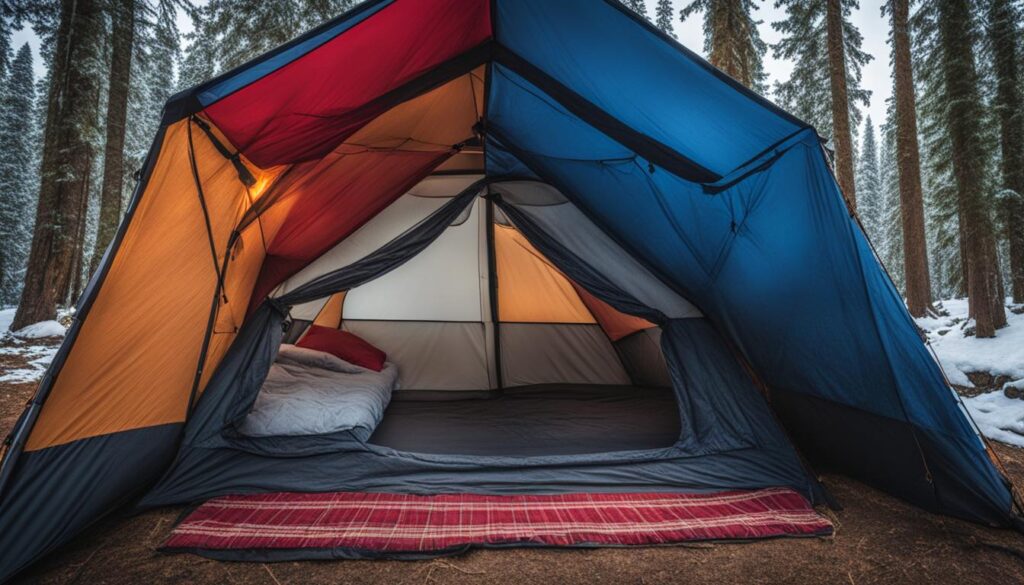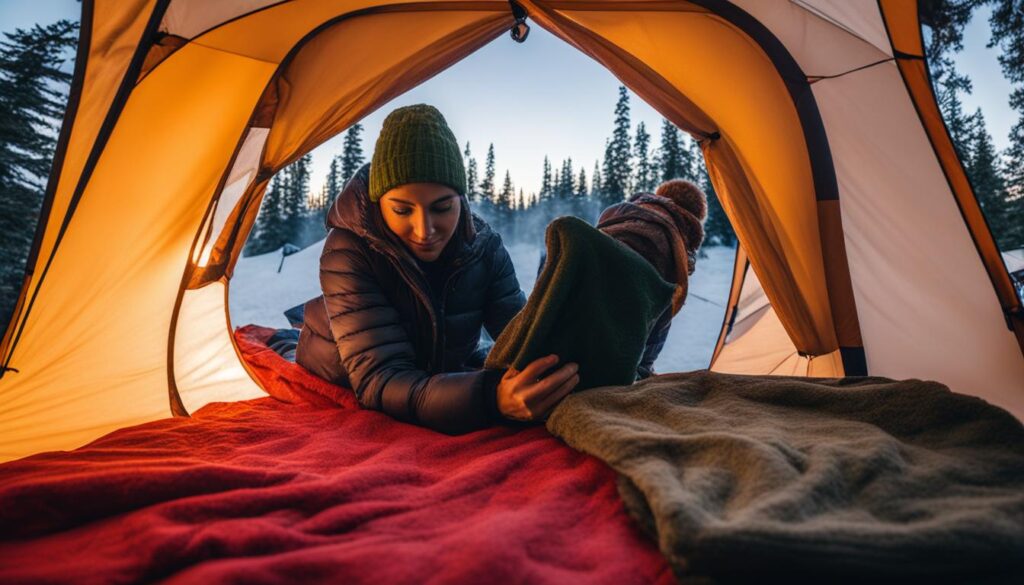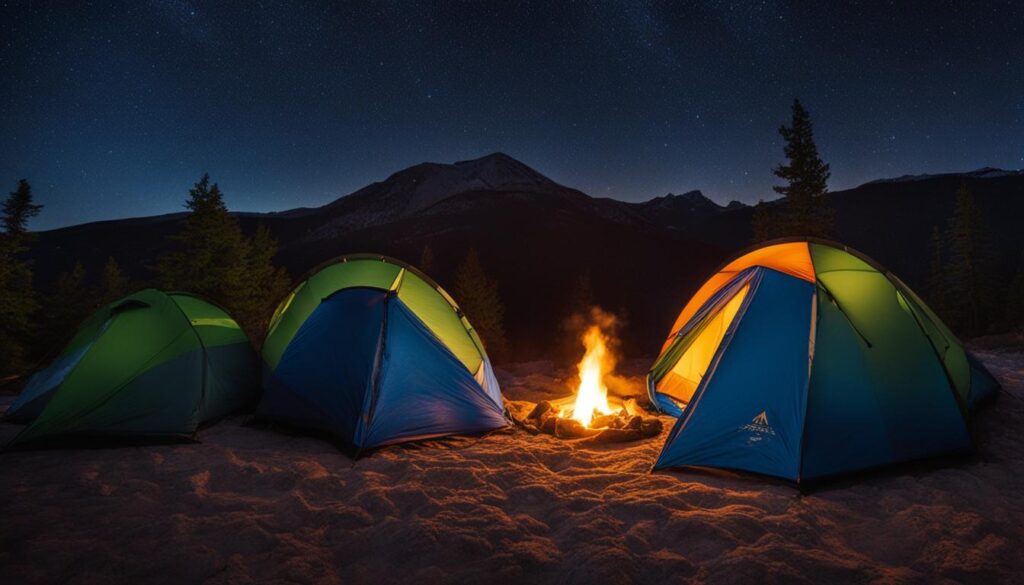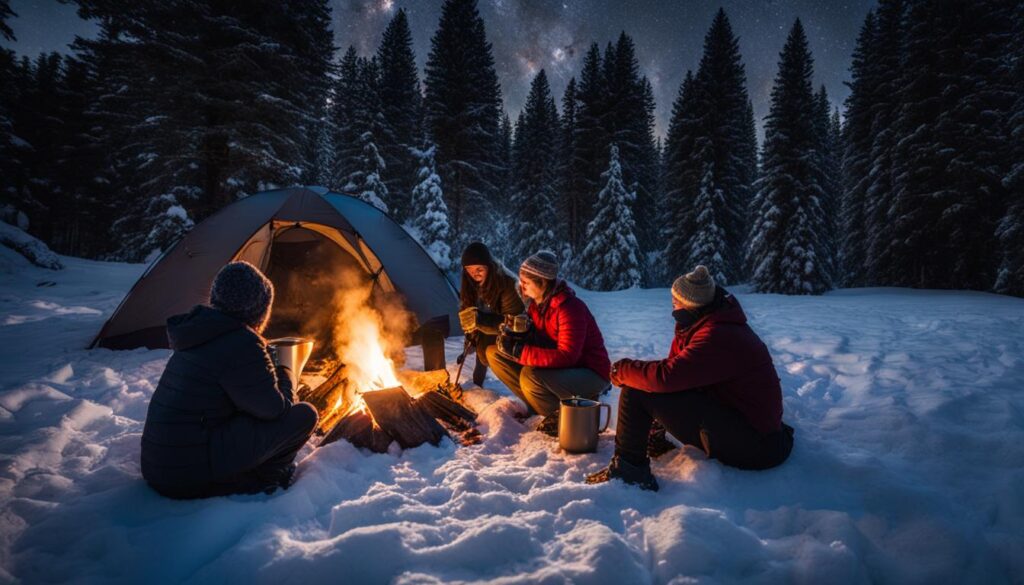Staying warm while tent camping is crucial for a comfortable and enjoyable outdoor experience. With the right preparation and gear, you can stay cozy even in cold weather.
Key Takeaways:
- Choose a smaller tent or invest in a four-season tent designed for winter camping.
- Select a campsite sheltered from the wind and with morning sun exposure.
- Pitch your tent tightly and ensure proper ventilation to prevent condensation.
- Invest in a warm sleeping bag with an EN or ISO temperature rating.
- Use an insulated sleeping pad to prevent cold from seeping through the ground.
Contents
Choose the Right Tent
When it comes to staying warm during your tent camping adventures, the type of tent you choose is crucial. Opting for the right tent can significantly impact how well insulated you are against the cold weather. Here are some important factors to consider when selecting your tent:
- Size: Smaller tents are easier to heat than larger ones since they have less space to keep warm. Consider choosing a tent that comfortably fits the number of people in your group while also providing enough room for your gear.
- Insulation: Investing in a four-season tent is a great choice for camping in cold weather. These tents are specifically designed to withstand winter camping conditions and offer superior insulation. They often have fewer mesh panels, which helps retain heat, and are built to withstand heavy winds and snowfall.
By selecting a smaller tent and investing in a four-season tent, you’ll increase your chances of staying warm and comfortable throughout your camping trip, even in chilly temperatures. Additionally, these tents provide added durability to withstand the elements.

Pick a Good Campsite
Choosing the right campsite is essential for staying warm while tent camping. Various factors can impact the temperature inside your tent, including wind, sunlight, and elevation. By strategically selecting your campsite, you can maximize your comfort and ensure a cozy camping experience.
Sheltered from the Wind
Cold wind can make you feel colder even inside a tent. Look for a campsite that offers natural wind protection, such as a grove of trees or hills. These natural barriers can help block the wind and create a more comfortable camping environment. Additionally, camping near a large boulder or rock formation can provide additional shelter from the wind.
Morning Sun Exposure
Sunlight can play a significant role in warming up your tent. Choose a campsite that receives morning sun to take advantage of natural heat. When the sun rises and shines directly on your tent, it can help warm up the interior and make it more comfortable. Keep in mind that the sun’s position changes throughout the day, so consider this when selecting your campsite.
Select Lower Elevations
Camping at lower elevations can be warmer than higher elevations, especially in mountainous areas. Cold air tends to sink to lower areas, making them relatively warmer compared to higher regions. When scouting for a campsite, consider the elevation and opt for lower areas to increase your chances of staying warm.
“Choosing the right campsite can make a significant difference in how warm you stay while tent camping. Protect yourself from the cold wind, take advantage of morning sun exposure, and consider lower elevation areas for a more comfortable camping experience.”
Fight Condensation
Condensation can make you feel cold and damp inside your tent. To prevent condensation, it’s important to pitch your tent tightly and ensure proper ventilation.
First, make sure to tighten the attachment points of your tent’s fly and stake it out well. This helps prevent condensation from forming inside the tent by creating a taut and stable structure.
Next, leave the tent vents open, especially those located higher up. This allows moisture to escape and keeps the interior dry. By allowing fresh air to circulate, you can minimize condensation and maintain a cozy and comfortable environment inside your tent.
Remember, staying warm in a tent is not just about insulation and sleeping gear; managing condensation is equally important. By following these simple tips, you can stay cozy in your tent and enjoy a comfortable camping experience, regardless of the weather conditions outside.

Key takeaways:
- Pitch your tent tightly and ensure proper ventilation to prevent condensation.
- Tighten the attachment points of your tent’s fly and stake it out well to create a taut structure.
- Leave the tent vents open, especially those located higher up, to allow moisture to escape.
Bring a Warm Sleeping Bag
A warm sleeping bag is crucial for staying warm while tent camping. When selecting a sleeping bag, there are a few key factors to consider. Look for a sleeping bag with an EN or ISO temperature rating. These ratings provide accurate information about the bag’s warmth and help you choose the right one for your needs. Consider the comfort rating as well and choose a bag that is suitable for the coldest temperature you expect to encounter during your camping trip.
Ensure that the sleeping bag has a hood to cover your head and keep it warm. Hoods help retain body heat and protect your head from the cold. Look for a bag with extra insulation in the hood and around the neck area to prevent drafts from entering.
In addition to a warm sleeping bag, you can take an extra step to maximize insulation. Tuck dry clothing into the sleeping bag before you go to sleep. This extra layer of insulation adds warmth and helps trap body heat inside. Make sure the clothing is dry to avoid feeling damp and cold during the night.

Benefits of a Warm Sleeping Bag
- Keeps you cozy and comfortable during cold nights
- Retains body heat to prevent hypothermia
- Protects against drafts and cold air
- Allows for a restful night’s sleep
“A warm sleeping bag is not just a luxury; it is a necessity for camping in cold weather.” – Outdoor Gear Experts
Use an Insulated Sleeping Pad
When it comes to staying warm while tent camping, a quality sleeping pad is just as important as a warm sleeping bag. While a sleeping bag provides insulation from above, an insulated sleeping pad prevents the cold from seeping through the ground.
Avoid using traditional blow-up air mattresses, as they do not provide sufficient insulation. Instead, opt for an insulated sleeping pad with a high R-value. These pads are specifically designed to retain your body heat and keep you warm throughout the night.
Foam pads are a popular choice for insulation, as they provide excellent stability and insulation. Alternatively, you can choose sleeping pads insulated with down or synthetic fibers, which offer superior warmth and insulation capabilities. Invest in a sleeping pad that suits your needs and the specific conditions you’ll be camping in, ensuring a comfortable and cozy night’s sleep.
FAQ
How can I stay warm while tent camping?
To stay warm while tent camping, choose a smaller tent or invest in a four-season tent for better insulation. Select a campsite sheltered from the wind and with morning sun. Properly pitch your tent and ensure proper ventilation to prevent condensation. Use a warm sleeping bag with a hood and insulation, and consider tucking dry clothing inside. Use an insulated sleeping pad to prevent cold from the ground.
What type of tent should I choose for camping in cold weather?
For camping in cold weather, it is best to choose a smaller tent that is easier to heat. Consider investing in a four-season tent designed for winter camping, as they provide better insulation and can withstand heavy wind and snow.
How can I choose a good campsite for staying warm while tent camping?
To choose a good campsite for staying warm while tent camping, look for a location sheltered from the wind. Select a campsite that receives morning sun to help warm up your tent. Additionally, camping at lower elevations can be warmer than higher elevations in mountainous areas.
How can I prevent condensation inside my tent?
To prevent condensation inside your tent, pitch it tightly and ensure proper ventilation. Tighten the attachment points of your tent’s fly and stake it out well to prevent condensation from forming. Leave the tent vents open, especially those located higher up, to allow moisture to escape and keep the interior dry.
What type of sleeping bag should I bring for tent camping in cold weather?
When tent camping in cold weather, it is important to bring a warm sleeping bag. Look for a sleeping bag with an EN or ISO temperature rating for accurate information on its warmth. Choose a bag with a comfort rating suitable for the coldest temperature you expect to encounter. Ensure the sleeping bag has a hood and extra insulation to keep out drafts, and you can also tuck dry clothing inside for added warmth.
What type of sleeping pad should I use for camping in cold weather?
For camping in cold weather, it is important to use an insulated sleeping pad. Avoid traditional blow-up air mattresses, as they do not provide insulation. Opt for a sleeping pad with a high R-value to prevent cold from seeping through the ground. Foam pads are a popular choice, but you can also find pads insulated with down or synthetic fibers.






